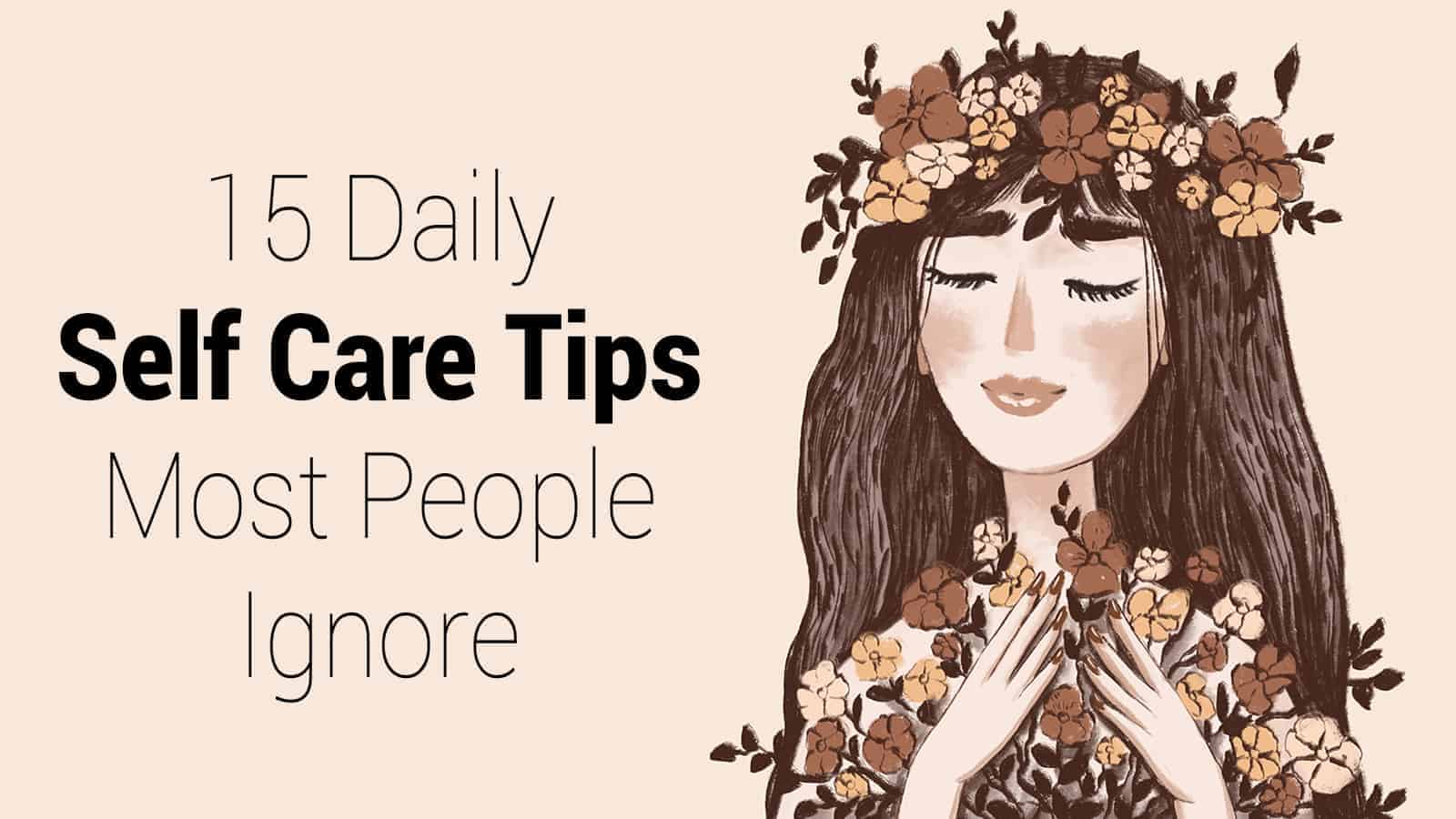Do you find that you’re so busy caring about everything and everyone in your life that you end up putting your own needs last? It’s a common problem for many people. When you constantly put your needs on hold, your health and sense of well-being can suffer. You need a good plan for daily self care!
Why is self care so critical?
Self-care is taking time to do what benefits your mental and physical health. Self-care helps you achieve these outcomes:
- Manage stress
- Lowers your anxiety
- Reduces your risk of getting sick
- Improves your energy and stamina
Research shows that even seemingly small self-care daily habits impact your health and happiness.
20 Daily Self Care Tips Most People Overlook
Your self-care might look different from someone else, but that’s okay. Find what works best for you and incorporate it into your daily or weekly schedule. Here are some daily self care tips that most people overlook.
 1 – Spend time alone
1 – Spend time alone
Getting some time by yourself seems luxurious when you have a busy life. But it could be the self-care that you need to get recharged and refreshed. A study found that “spending time alone” was the fifth-most restful activity people liked to do. Whether you read a book or binge-watch a favorite television show, try spending some time alone this week to practice a little self-care.
2 – Unplug for some daily self care time
Life revolves around your phone and computer. But once in a while, you need to take a break from technology. Unplugging gives your brain a rest. It gives you the chance to listen to your thoughts and focus on what makes you happy. Sit in a cozy chair with your coffee in your hand and think. You may be surprised by how pleasant it is. Getting unplugged can help you not relax but connect to some simple pleasures in your life.
3 – Add a brisk walk to your self care checklist
Going for a daily walk can do wonders for your mind and body. Walking has so many benefits. Some of them include the following:
- Lose weight: Walking just 30 minutes a day tone your body and help you burn calories.
- Improve your health: Individuals who walk regularly are less apt to have a heart attack or stroke.
- Lowers your cholesterol: Regular walking lowers your blood pressure and raises your HDL, healthy cholesterol. It also lowers your LDL, which is bad cholesterol.
- Improve your mood: Walking makes you feel happier. When you walk, your body releases hormones that give you a sense of pleasure and make you feel more optimistic.
- Reduces stress: While you walk, breathe in the fresh air and enjoy the sunshine. You can let go of tension and stress.
4 – Buy a small luxury for yourself
Sometimes it’s the little things that have a significant impact, like treating yourself to a small luxury. It’s a simple way to take care of yourself. The item doesn’t need to be expensive, but just something to help you feel special. You could get a new outfit or some special dessert plates, or a cute beaded bracelet. Whatever you choose, enjoy the pleasure of doing something nice for yourself for a change.
5 – Write in a self care journal
Journaling is a helpful way to get your thoughts out of your head and onto paper. Research suggests that journaling can decrease your mental distress, increase your sense of well-being and improve the quality of your life. There are so many nice looking journals, so pick the one you love. Purchase the perfect pen and start writing. Try to not just write down your problems in your self-care journal, but also note what you’re grateful for, plus the positive things that happened to you each day.
6 – Sleep is essential to daily self care
Sleep is one of the most overlooked self-care tips on your self-care checklist. Getting good quality sleep isn’t always easy with little kids, a busy social life, and a demanding career. But if you’re committed to good self-care, then it may be time to make sleep a priority. Here are some tips for getting good sleep:
- Keep a sleep routine: Try to keep a routine bedtime every night.
- Keep your bedroom for sleeping: Remove your television, desk, and exercise equipment from your bedroom. Make it a room just for sleeping or sex.
- Don’t eat too close to your bedtime: Eat your last meal several hours before you retire for the night.
- Turn off your phone and computer: An hour before you retire, reduce your exposure to blue light devices. Blue lights affect your brain, so you can’t fall asleep if you’re on them near bedtime.
- Relax: At least two hours before your bedtime, relax. Take a bath, read a book or sit outside on your patio and enjoy the stars.
Aim to get at least seven to nine hours of sleep every night. If you cannot sleep, try a natural remedy like melatonin or a supplement of calcium and magnesium.
7 – Stay connected to your friends and family
Part of self care means staying connected with your friends and loved ones. These relationships are essential to you, and not getting time with them can harm your life. These relationships provide you with emotional support as well as practical help. Research suggests that you have a decreased risk of disease when you’re in high-quality, close relationships. So, get that hug from your grandma. It’s an excellent way to take care of yourself.
 8 – Lower your stress level
8 – Lower your stress level
Self care is understanding what causes you to feel stressed and avoiding it. Perhaps you find your commute to work incredibly stressful, or your busy weekends stress you out. Could you take the train to work instead of driving? Could you do less on the weekends to give you time to rest?
One family took a break from their kids’ sporting events for a year. On the weekends, the family visited local museums and parks. The entire family felt it was a less stressful year and helped them grow closer as a family.
9 – Play a game
Games are a great stress reliever. Whether you choose to play a board game with your family or friends or select an online word game, it’s a great way to let go of tension. Plus, playing games stimulates your brain and makes you feel relaxed.
10 – Eat healthy snacks
If you’re aiming for better self care, don’t forget about your snacking habits. Try eating to nurture your body rather than trying to reduce calories. For instance, eat foods higher in protein to offset your hunger for a more extended period. Choose high-protein foods like:
- Nuts
- Hard-boiled eggs
- Lean meats
- Peanut butter
- Yogurt
Eating healthier proteins helps you avoid a carbohydrate blood sugar crash that zaps your strength and makes you foggy-brained.
11 – Read (a top self care idea for many!)
Reading is a natural way to relax. Researchers found that leisure reading improves your health. If you’re not much for long reads, try reading some short self care quotes. The benefits of reading include the following:
- Reduced stress
- Better ability to think
- Better communication skills
- Improved understanding
You can listen to audiobooks to get the same effect as a regular reading session. Find a cozy chair, close your eyes and let the audiobook transport you to another place.
12 – Exercise
Regular exercise is a simple way to take care of yourself. Walking thirty minutes a day boosts your mood and improves your health. Whether you break it up and walk for ten minutes during your lunch break and twenty later in the evening, small amounts of exercise are just as beneficial.
13 – Try relaxing with music
Music is therapeutic. Most people don’t realize that music is an easy way to improve your mood and reduce anxiety and stress. Music makes you feel happier and
14 – Declutter
Did you know that decluttering your house can improve your mood? When there is clutter around you, you’re more likely to feel stressed and anxious. Living in a cluttered space will raise your cortisol levels. Tackling a messy closet or room for just a few minutes will make you feel more in control of the area and less stressed.
15 – Get a massage
Self care is essential for your physical and mental health. Scheduling a massage is a great way to increase your relaxation and lower your stress. Massages reduce your heart rate, calm your mind and body. Other benefits of a weekly massage include
- Increased relaxation
- Reduced joint pain
- Less muscle soreness
- Better circulation
- More energy
- Feeling more alert
- Lower blood pressure
- Lower your heart rate
 Final thoughts on Trying These Daily Self Care Tips
Final thoughts on Trying These Daily Self Care Tips
If you’re busy taking care of everyone and everything in your life, maybe it’s time to schedule some self-care time for yourself. Taking care of yourself is essential to be the best person you can be at work, home, or school. It’s not selfish to want to get a break from life’s busyness. Self care is different for everyone, but hopefully, one of these tips helps you incorporate some self care into your daily routine.


















